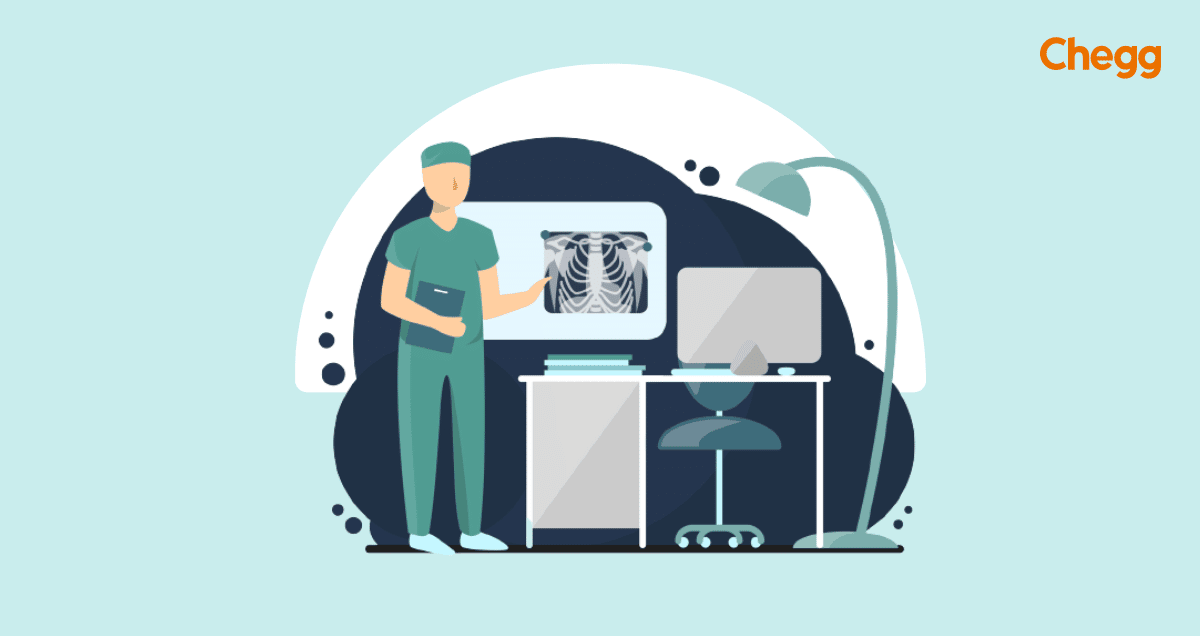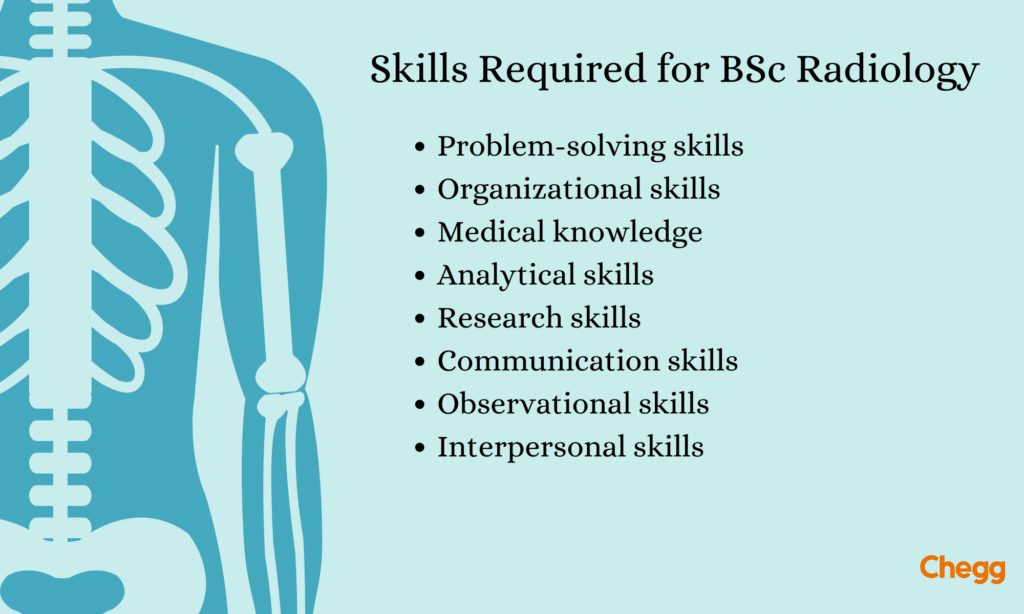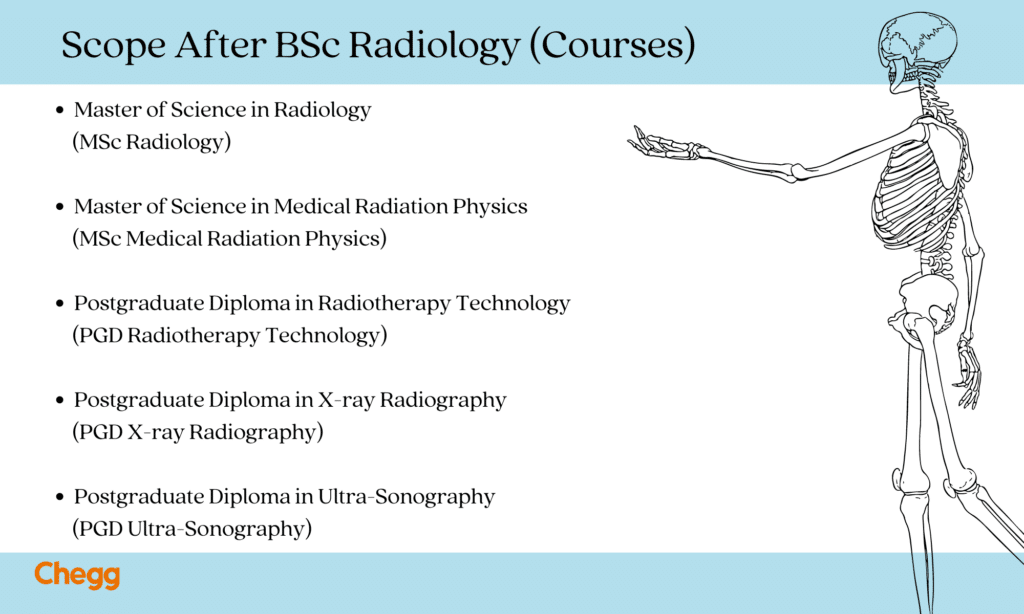

Quick Summary
- A BSc in Radiology is a 3-year undergraduate paramedical course for students who wish to focus on the technical aspect of medicine.
- Some of the top colleges in India for pursuing a BSc in Radiology are AIIMS Delhi, CMC Vellore Tamil Nadu, ILBS New Delhi, KGMU Lucknow, and BMCRI Bangalore.
- Career paths as radiologic technologists, MRI technicians, CT technologists, or ultrasound technologists in healthcare settings.
Table of Contents
If are you thinking about a career in the medical field which is not Doctor or Dentist, then opting for BSc in Radiology might be an option for you. It is one of the paramedical courses which deals with the technical part of medicine rather than treating and operating on patients.
The course leads to the Radiology field which includes a range of imaging modalities such as X-rays, computed tomography (CT), magnetic resonance imaging (MRI), ultrasound, and nuclear medicine.
And BSc Radiology courses are one sure way to make a career in this field.
What is BSc Radiology?
Bachelor of Science in Radiology (BSc Radiology) is a 3-year graduate program. It is one of the best paramedical courses for students who want to have a medical practice in diagnostics using radiation technology. It is a specialized field within the broader discipline of medical imaging.
The BSc Radiology program provides students with a comprehensive understanding of these imaging techniques, their principles, and their clinical applications. Its curriculum typically combines theoretical knowledge with hands-on training, aiming to develop competent and skilled radiographers who can safely operate imaging equipment and produce high-quality diagnostic images.
BSc Radiology – Key Highlights
| Course Name | BSc Radiology |
| Course Level | Undergraduate |
| Time Duration | 3 years |
| Minimum Eligibility Required | 10+2 in Science Stream |
| Entrance Exams | NEET, AIIMS |
| Modes of Admission | Entrance exam or Merit-based |
| Fees for the Entire Course | From Rs. 10,000 to Rs. 10 lakhs |
| Top Recruiters | AIIMS, Government Hospitals, Fortis Hospitals, Manipal Hospitals, Apollo Hospitals |
| Job Profile | Radiographer, radiation protection specialist, X-ray technician, therapy radiographer, medical image analyst |
BSc Radiology Entrance Exams
Most of the universities and colleges admit students based on the scores obtained in entrance exams. Some of the major entrance exam scores accepted by most institutes are:
- NEET: National Eligibility cum Entrance Test (NEET) is a national-level exam for admissions to medical colleges in India. It is a relevant entrance exam for admissions to BSc Radiology and Imaging courses. A radiology eligibility test will then determine the university from which the candidate can pursue radiology.
- CUET: The Common University Entrance Test (CUET) is a national-level entrance exam conducted by the National Testing Agency (NTA) for admission to undergraduate courses like BSc Radiology colleges in India.
- CUCET: If you aspire to pursue a career in radiology and want to pursue a BSc in Radiology, the Central Universities Common Entrance Test (CUCET) is an essential examination to consider. CUCET is a national-level entrance exam conducted by a consortium of central universities in India.
- SET: The SET entrance exam is conducted by Symbiosis International University (SIU). It is an entrance test for various undergraduate programs offered by Symbiosis University, including BSc Radiology.
Top BSc Radiology Colleges in India
| Institute Name | Description | Estimated Fees |
|
AIIMS Delhi, New Delhi |
AIIMS Delhi is one of the premier medical colleges in India. It is duly recognised by the UGC and Medical Council of India and has secured 1st rank for the second time in the NIRF 2019 in the medical category. Making it a great choice to pursue Radiology courses. |
INR 50,000/year |
|
CMC Vellore, Tamil Nadu |
CMC Vellore was set up in 1900 by Dr MGR Medical University in Chennai, Tamil Nadu. CMC Vellore was ranked 3rd by the NIRF in 2019. It offers multiple under-graduation, and post-graduation in medicine like BSc Radiology. |
INR 1,00,000/year |
|
Institute of Liver and Biliary Science (ILBS), New Delhi |
ILBS is an autonomous institute that provides an international centre of excellence for diagnosis, management, training, and research. It is a deemed university by the University Grants Commission. |
INR 1,50,000/year
|
|
KGMU, Lucknow |
King George’s Medical University (KGMU) was established in Lucknow in 1911 and is recognized by UGC. It offers various courses in the field of medicine including BSc Radiology. |
INR 2,00,000/year |
|
BMCRI, Bangalore |
Bangalore Medical College and Research Institute (BMCRI) is one of the topmost medical colleges in the state of Karnataka and India. It is an autonomous institute in Bangalore and is affiliated with the Rajiv Gandhi University of Health Sciences. |
INR 2,50,000/year |

BSc Radiology Admission
BSc Radiology Eligibility
The eligibility criteria for BSc Radiology vary from college to college. However, the general eligibility criteria are as follows:
- The candidate must have passed 10+2 or equivalent examination from a recognized board with Physics, Chemistry, and Mathematics as compulsory subjects.
- The candidate must have secured a minimum of 50% marks in aggregate in the qualifying examination.
- And some colleges also require the candidate to have appeared for and cleared an entrance examination.
BSc Admission Process
Admission to the BSc Radiology course is based on performance in the entrance-level examinations. These are some of the important points for BSc Radiology admissions:
- An eligible candidate needs to clear 10+2 in the science stream. After clearing the same, they need to enrol for NEET examinations.
- You can also take the college’s own entrance exams for BSc Radiology.
- After that, the weighted average marks from both the board examinations and NEET entrance-level exams are considered. Usually, 60% weightage is given to the NEET examinations while 40% weightage is given to the board examinations.
- Once the candidate secures the required marks, the process moves ahead, takes the counselling, locks the seats allotted and avails himself the admission.
Also Read About More Branches of BSc:
BSc Anesthesia – Course Details and Jobs 2023
Courses and Career after B.Sc. Nursing in India

BSc Radiology Subjects and Syllabus
BSc consists of 6 semesters and a BSc radiology course duration of 3 years helping students obtain detailed knowledge about radiology. These are the BSc Radiology subjects and syllabus:
1st Year
|
Semester-I |
Semester-II |
|
Pathology |
General radiography |
|
Anatomy |
Fundamentals of computer science |
|
Physiology |
Radiation hazards and protection |
|
Generation and properties of X-ray |
Communication and personality development skills |
2nd Year
|
Semester-III |
Semester-IV |
|
General radiography 2 |
MRI 1 |
|
CT Scan 1 |
Environmental Science |
|
Ultrasound |
Organizational behaviour |
3rd Year
|
Semester-V |
Semester-VI |
|
Nuclear medicine and PET scan |
Intervention in diagnostic radiology |
|
MRI 2 |
Human resource |
|
CT Scan 2 |
Anaesthesia in diagnostic radiology |
|
Doppler and Echography |
|
Read More- BSc Cardiology Courses Details and Jobs in 2023
BSc Radiology Salary Trends
|
Job Prospects |
Average Salary (in INR) |
|
X-Ray Technician |
1.8 LPA |
|
Radiographer |
2 LPA |
|
Therapy Radiographer |
3 LPA |
|
Radiation Protection Specialist |
5.8 LPA |
|
MRI Technician |
3 LPA |
|
Radiology Consultant |
25 LPA |
|
Radiology Sales Representative |
2.7 LPA |
|
CT Technologist |
2.8 LPA |

8 Impressive Jobs After BSc Radiology
1. X-Ray Technician
Becoming an X-Ray technician after BSc Radiology is one good choice. As an X-Ray technician, you’re responsible for taking X-Rays of the internal anatomy of the patients. You’ll help physicians to identify and diagnose diseases, illnesses and injuries. Along with that, you must ensure that the patients are exposed only to a limited amount of radiation.
Roles and Responsibilities
- Attending mandatory training sessions and staff meetings
- Monitoring the radiology supplies, ensuring that the x-ray machines are set at the correct radiation levels
- Keeping the x-ray rooms clean and tidy all the time etc.
2. Radiographer
Radiographers are responsible for operating the X-ray equipment. They produce high-quality diagnostic images that are key to identifying internal abnormalities and injuries. Sonography, computed tomography, mammography, vascular interventional radiography, MRI etc. are some of the diagnostic images that radiographers produce using specialised equipment.
Roles and Responsibilities
- Operate X-ray equipment to produce high-quality diagnostic images.
- Explaining the test procedure to patients, answering their questions, and providing emotional support.
- Interpret images and report findings to radiologists. This includes identifying abnormalities, measuring distances and angles, and documenting findings.
- Maintain and troubleshoot X-ray equipment. Including ensuring that equipment is in proper working order and making repairs as needed.
3. Therapy Radiographer
Therapy Radiographer also known as radiation therapist is another great career to choose after completing BSc Radiology. As a therapy radiographer, you work with the oncology teams for determining the best course of radiation treatment for the patients. They work under the supervision of radiation oncologists and specialise in the planning and execution of radiotherapy treatments. As Radiation therapy is one of the most important treatments in treating cancer patients.
Roles and Responsibilities
- Conduct thorough patient assessments, including medical history review, physical examinations, and verification of treatment details.
- You have to operate advanced radiation therapy equipment, such as linear accelerators, to administer prescribed radiation doses to patients.
- Maintaining and calibrating equipment, following established protocols and safety guidelines.
4. Radiation Protection Specialist
As the name suggests, radiation protection specialists use scientific techniques and equipment to monitor and measure radiation and ensure safety at the workplace. It is a good job to do after BSc Radiology courses. In this job, you advise, assist, supervise and train employees regarding radiation safety compliances.
Roles and Responsibilities
- Conduct radiation surveys and measurements.
- Conduct research on radiation safety like studying the effects of radiation on human health and the environment, and developing new methods for protecting people from it.
- Advise government agencies and industry on radiation safety.
5. MRI Technician
An MRI technician is a medical professional who operates magnetic resonance imaging (MRI) machines. You can become MRI Technician after BSc Radiology where you use a non-invasive medical imaging technique that uses a strong magnetic field and radio waves to create detailed images of the body’s internal structures.
Roles and Responsibilities
- MRI technicians are responsible for preparing patients for scans, operating the MRI machine, and monitoring patients during scans.
- Additionally, they also work with radiologists to interpret the images and develop treatment plans.
6. Radiology Consultant
Becoming a radiology consultant after BSc Radiology is a great field. These are the doctors who specialize in the diagnosis and treatment of diseases using medical imaging techniques. They use a variety of imaging modalities, including X-rays, CT scans, MRIs, and ultrasounds, to create images of the body’s internal structures. Radiology consultants work in a variety of settings, including hospitals, clinics, and imaging centres. They may also work as part of a team of doctors, including surgeons, oncologists, and cardiologists.
Roles and Responsibilities
- Interpret medical images, such as X-rays, CT scans, MRIs, and ultrasounds, to diagnose diseases.
- Plan and perform medical imaging procedures, such as biopsies and interventional radiology procedures.
- Consult with other doctors, such as surgeons and oncologists, to provide the best possible care for their patients.
7. Radiology Sales Representative
A radiology sales representative is a healthcare professional who sells radiology equipment and services to hospitals, clinics, and other medical facilities. You can choose this career after BSc Radiology if you have a strong understanding of radiology technology and be able to explain the benefits of their products and services to potential customers. Radiology sales representatives also need to be able to build relationships with customers and develop trust.
Roles and Responsibilities
- Identify and qualify potential customers including researching potential customers, understanding their needs etc.
- Develop and maintain relationships with customers.
- Present and demonstrate products or services to customers.
8. CT Technologist
Becoming a CT technologist is another choice that you can go with after studying BSc Radiology. As CT Technologist you will operate computerized tomography (CT) scanners to produce cross-sectional images of internal organs and tissues for the diagnosis of medical issues of patients. As CT technologists you must have a strong understanding of anatomy, physiology, and pathology.
Roles and Responsibilities
- Operate CT scanners to produce diagnostic images of the patient’s internal organs and tissues.
- Administer contrast agents to patients, as needed.
- Recording the patient’s medical history, the scanning procedure, and the results of the scan.
Related:
DMLT Course: Details, Admission, Eligibility, Scope
Top 15 Career Options in Biology- Skills & Salary
In a Nutshell
BSc Radiology course is a great course for you if you want to make a career in the medical field and have an interest in technical work. And this blend of technical and medical makes it an overall interesting career for many. And after completing the course you can opt for any job like CT Technologist, Radiologist, or Sales Representative in the medical field, the possibilities are endless.
Dive into our comprehensive Career Advice section for valuable insights and resources to propel your career forward.
Also Read- BSc Courses and Jobs in India
Frequently Asked Questions
What is BSc Radiology?
BSc Radiology course is a 3-year undergraduate qualification in the field of radiology. It is a paramedical course for students who are willing to learn and chart a career in diagnostic tests that use radiation technology.
Is BSc Radiology a good career?
Yes. BSc Radiology is a good career option for medical students. It offers multiple job opportunities with good earning potential and students can even go for specialisations ahead. Some of the great career options after BSc Radiology are:
1. Radio Consultant
2. CT Technologist
3. Radiographer
4. X-Ray Technician
5. MRI Technician
Does BSc Radiology require NEET?
Yes. NEET is the entrance exam for BSc Radiology. Apart from NEET, there can be specific university-level exams as well depending on the universities. Some of the other entrance exams conducted for BSc Radiology admission are:
1. CUCET
2. CUET
3. SET
Which college at DU offers BSc Radiology?
There are multiple universities in Delhi that offers BSc Radiology course. Some of the most prominent universities include:
1. AIIMS Delhi
2. Jamia Hamdard
3. University College of Medical Science
What are the entrance exams required for pursuing BSc in Radiology in India?
For pursuing BSc in Radiology in India, students need to complete their 10+2 education in the science field. After which they need to clear the National Eligibility cum Entrance Test (NEET) for getting enrolled in a medical college or university. However, CUET, CUCET, and SET are some of the other major entrance exams conducted for radiography courses admission.
To read more related articles, click here.
Got a question on this topic?